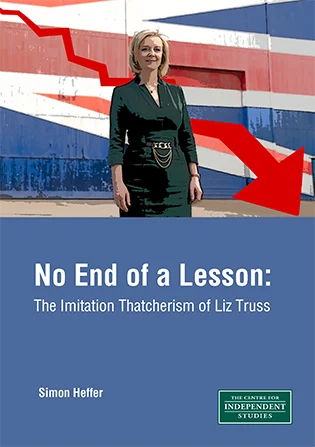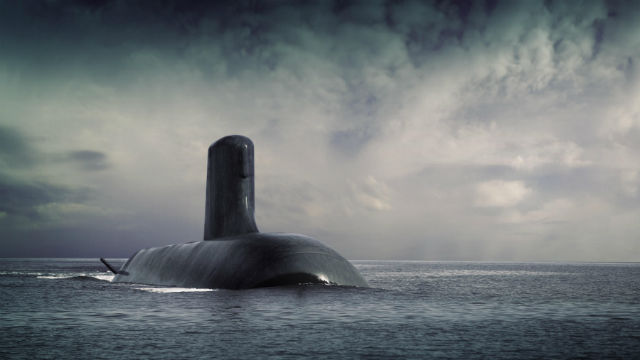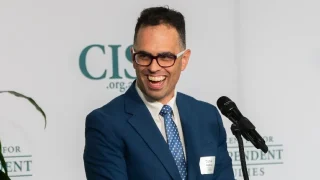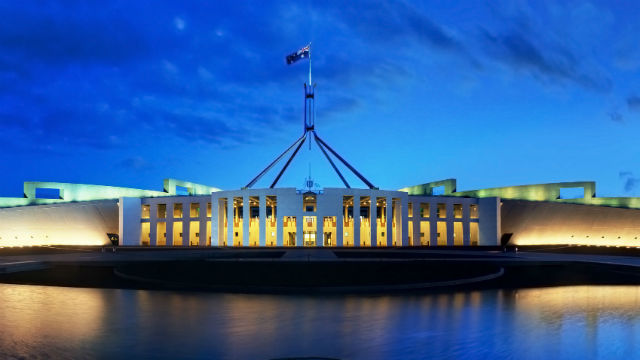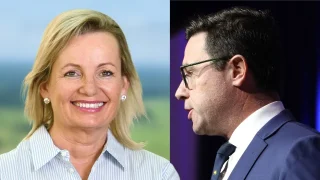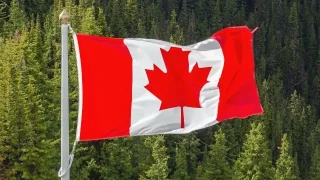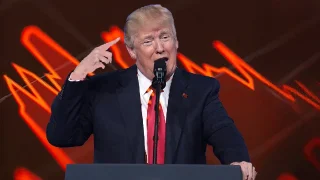The so-called ‘Trussonomics’ of Liz Truss’s short-lived and ill-fated premiership were based on an ignorance of the true discipline of economics, and bore little resemblance to the politics of ‘sound money’ on which the British Conservative party has for decades prided itself. It was motivated by the ruthless determination of her faction within the Conservative party to win power, in which promises were far easier to make than to keep. Far from being modelled on the politics of Margaret Thatcher, the Truss administration’s approach to economics was without precedent and any prospect of success. These failings must be seen as distinct from the sensible and rational pursuit of genuine free-market economics and Thatcherism, which if allowed to operate properly can provide long-term prosperity. ‘Properly’ means avoiding unnecessary debt, and certainly avoiding the temptation to borrow money to fund tax cuts. It had been clear for some time before she became prime minister that Truss thought she was a reincarnation of Thatcher: sadly for her and for her country, she was not.
Introduction – No End of a Lesson: The Imitation Thatcherism of Liz Truss
During 2022, the United Kingdom was forced to accept it had been sucked into an economic debacle. So had much of Europe and the Western world. Two factors had combined in a perfect storm of political and financial misfortune. First, the pandemic that began early in 2020 drained treasuries of money in subsidies for those workers ordered on furlough to avoid catching, or spreading, Covid-19, and for businesses that governments forced to close for months on end.
Then, when the post-pandemic economic recovery had barely had a chance to gain momentum, as societies resumed normal economic activity, Russia invaded Ukraine in February 2022 and caused further disruption. Several major European economies, notably Germany and Italy, had become heavily dependent on the aggressor’s exports of gas and oil.
When sanctions were imposed by the West on Russia, the shortage of energy supplies drove prices up across the developed world and across the board; with inflation already having been stoked by the considerable growth in the supply of liquidity across the western economies when money was being printed during the pandemic. Food prices also rose because of the war, with exports of cereal crops from Ukraine being severely limited for a time by a Russian blockade on the Black Sea, and supplies of fertilisers for farmers running low. A ‘cost of living crisis’ became the talk of the free world.
But on top of all that, Britain had a separate — and complicated — political problem in the summer and autumn of 2022 that would lead not just to an exacerbation of its economic challenges through neglect and mismanagement, but would also undermine free market doctrines. In a little over six weeks, the country had three prime ministers, the tenure of the second, Liz Truss, being at 45 days the shortest in 301 years of the country’s constitution having that office. It was the economic policy of her short-lived administration that did the damage, spooking the very markets she and her supporters claimed to revere — not least because they seemed not really to understand markets, what they are or how they operate.
This outbreak of amateur hour has already had a serious impact on the idea of conservatism in the United Kingdom, damaging it by association with a ludicrous policy of low taxes and high spending. The wider danger is that there may yet be a form of contagion around non-socialist parties throughout the West, causing some of them to re-think a commitment to pursuing economic growth through low taxation and a small state.
What this paper hopes to demonstrate is that the so-called ‘Trussonomics’ of Liz Truss’s short-lived and ill-fated premiership were based on an ignorance of the true discipline of economics, and bore little resemblance to the politics of ‘sound money’ on which the British Conservative party has for decades prided itself. It was motivated by the ruthless determination of her faction within the Conservative party to win power, in which promises were far easier to make than to keep. Far from being modelled on the politics of Margaret Thatcher, the Truss administration’s approach to economics was without precedent and any prospect of success.
These failings must be seen as distinct from the sensible and rational pursuit of genuine free-market economics, which if allowed to operate properly can provide long-term prosperity. ‘Properly’ means avoiding unnecessary debt, and certainly avoiding the temptation to borrow money to fund tax cuts. It had been clear for some time before she became prime minister that Truss thought she was a reincarnation of Thatcher: sadly for her and for her country, she was not.
The end of Boris Johnson and his economic legacy
Boris Johnson was prime minister of the United Kingdom from July 2019, but resigned on 7 July 2022 after the resignations of around two-thirds of his administration’s payroll vote demonstrated a catastrophic loss of confidence in him. Because of having to wait for the outcome of a leadership contest to replace him, Johnson did not leave office until 6 September, two days before the death of Queen Elizabeth II. He claimed to have done the two things he was elected to do — to win a big overall majority for his party and to have ‘got Brexit done’.
However, his achievements using his majority were minimal. This was partly because of his ingrained laziness, lack of attention to detail and desire for power for power’s sake. He did indeed lead Britain out of the European Union at the end of January 2020, but with a deal he called ‘oven-ready’ that was in fact half-baked.
To this day, a hot dispute continues about the treatment of Northern Ireland following Brexit; and despite a handsome parliamentary majority of around 75, the ability to deregulate that departure from the European Union made possible has not been exploited. Campaigners for Brexit argued that Britain’s economy would be enabled to grow as a result of this deregulation, and that Britain would be able to make lucrative bilateral trade deals once no longer forced to act in concert with the EU.
Partly because of Johnson’s lassitude and insipid leadership, neither of these things has yet occurred. In his defence, Johnson’s now small band of supporters claim this was because of the concentration he had to apply to management of the pandemic after February 2020. However, that pandemic management was not so rigorous as Johnson’s PR machine would have one believe, and ended up doing serious damage to the British economy by following an aggressively statist approach to the problem.
Johnson missed the first five emergency meetings convened by Whitehall’s Cabinet Office in February 2020, as Covid-19 laid waste to large communities in Northern Italy and made its way across Europe, and anxiety was rising in the rest of Europe and in the United Kingdom. It was disclosed that Johnson had gone on holiday to the English countryside, allegedly to work on a book he is supposed to be writing on Shakespeare: but it has subsequently emerged that the book has not even been begun.
A full inquiry is under way about the Johnson administration’s management of Covid-19, so the truth will eventually emerge. So, too, will the truth come out about the economic management of aspects of the crisis, notably the procurement of personal protective equipment (PPE), and the costs and extent of funding a furlough scheme.
Again, Johnson’s attention to detail was wanting, and decisions to spend money were, it seems, routinely taken only with regard to the possible political consequences of not taking them, with little or no consideration given to value or actual effectiveness. The furlough, or Job Retention Scheme, cost £70bn, but other forms of business support — the cost of ordering large sections of commerce to be inactive while the pandemic was brought under control — took the total to over £122bn. Also, tax receipts fell by £36bn in 2020-21. The British Medical Journal reported on 3 February 2022 that the government had written off £10bn of spending on PPE that had either turned out to be useless, or was not delivered, or was above the market price. A culture of profligacy and unaccountability that Conservatives normally apply to the conduct of governments of the left was in full cry during the pandemic, and the lack of scrutiny started at the top.
A government report published in March 2022 estimated the full cost to the state — or rather to the British taxpayer — of managing the pandemic was between £310bn and £410bn. Government borrowing was increased to £323bn in 2020-21. Rather naively, the report observed that “as the cost of borrowing is currently very low, this doesn’t pose an immediate problem, but does leave the public finances vulnerable to increase in these costs.” With the Bank of England’s interest rate having risen from just over zero per cent to 3 per cent in that time, vulnerable is putting it mildly: and rates are forecast to rise further. It was against that background that the reckless experiment of Trussonomics was conducted, and which the austerity programme of the successor Sunak administration is now attempting to treat.
Johnson was eventually brought down by serial mismanagement of his administration and by poor conduct in public life. At time of writing, he remains under investigation by the House of Commons Standards Committee, which is expected to conclude that he lied to the House about illegal parties held in Downing Street during the pandemic. He was fined by the police for attending one of these, becoming the first British prime minister to admit guilt to a criminal offence. It was indicative of the chaos that characterised his administration, one result of which was to leave a legacy of record high public spending and debt. There had been a massive transfer of scarce resources from the productive to the unproductive sectors of the economy; the printing of money had stoked up inflation, which now stands in the United Kingdom at over 11 per cent. Much of the debate among those who made bids to succeed Johnson in Downing Street focused on who could get the economy growing again most effectively.
Conservative leadership campaign, Jul-Sep 2022
Eight MPs stood on 13 July in the first round of the contest to succeed Johnson, three others having failed to attract sufficient nominations. A week later, the final two candidates, who would campaign against each other until voting closed on 2 September, were settled upon: Rishi Sunak, the former Chancellor of the Exchequer who had the support of the highest number of Conservative MPs, and Liz Truss, the Foreign Secretary. Economic policy came to dominate the debates between the two candidates. Sunak, who despite his domination of the parliamentary party enjoyed little support from the Tory press, found himself caricatured as a prisoner of Treasury orthodoxy and therefore an opponent of the tax cuts so many members of his party, conservative voters, longed for. Truss found herself labelled ‘right wing’, partly because of her conscious and rather jejune modelling of her style upon that of Margaret Thatcher, but also because of her loud advocacy of tax cuts.
It was on this matter that a paradox emerged between the two candidates. As well as being accused of too rigid adherence to the Treasury’s beliefs, Sunak found himself being caricatured effectively as a ‘Blairite’ — an adherent of the approach of Tony Blair, the country’s most successful prime minister since Thatcher, who attempted (not entirely successfully) to contain the tax burden while maintaining a high level of public spending. Sunak was certainly reluctant to look for spending cuts, for fear of undermining public services that were held dear by the public and who, as so often, assumed someone other than themselves was paying for them. As a result, he did not promise immediate tax cuts.
On the other hand, the ‘Thatcherite’ Truss promised dramatic tax cuts to stimulate economic growth, but gave little indication in her campaign of where the money to do this would come from. For all her desire to emulate – or rather, to imitate –Thatcher, her grasp of the history of the Thatcher years was manifestly poor. Thatcher never made unfunded tax cuts, and certainly never borrowed money in order to cut them. Indeed, early on in her premiership she raised taxes to create a sound economic base from which borrowing and spending could be cut, and growth could then proceed, to ensure the markets were not alarmed by her stewardship of the economy. That was the root of her success in transforming British economic power in the 1980s, and what other nations later imitated. The lesson was lost on Truss and her faction, who would quickly give the impression (rather like Johnson) of wanting the keys to the toy cupboard at all costs, without necessarily understanding how the main items within it worked.
Truss thus gained a reputation among those who would vote for the leader — 160,000 or so fully paid-up members of the Conservative party — as the candidate who would transform the country’s economic future after the damage done by the pandemic, and the new problems inflicted by the war in Ukraine. It was a message with which Sunak found his own brand of centrist caution could not compete. The more she emphasised her return to alleged Thatcherism, the more her following grew in the Tory press and among the predominantly elderly mass membership who recalled the achievements of the Thatcher era.
Sunak was also handicapped by having had the guts to resign from Johnson’s cabinet, saying when he did that public life had to be “conducted properly, competently and seriously”; none of which Johnson could be accused of having done. Johnson’s substantial appreciation society among the Conservative membership, who remained largely oblivious to his grotesque defects and persisted in regarding his degradation of public life and carelessness with public funds as apparently trivial, chose to punish Sunak for his noble act by regarding it as some sort of act of treachery and supporting Truss as their means of revenge upon him. To say that the electorate in the Conservative party leadership contest paid any serious regard to the mechanics of what came to be called ‘Trussonomics’ would be rather far-fetched.
Truss’s headline promises were to cancel a planned rise from 19 to 25 per cent in Corporation Tax for larger concerns, and reverse a recent imposition of higher National Insurance rates. She did indicate that this would in part be funded by delaying the date from which it was planned to reduce the national debt, a fatal miscalculation given that interest rates, and therefore the cost of servicing that debt, were already moving up. However, some sceptics, and Sunak himself, worked out that the level of tax cuts already mentioned in her campaign would be more than simply withholding debt repayments could provide.
Truss did not invent her economic programme for the purposes of her leadership campaign: it had its origins in the Free Enterprise Group of Conservative MPs, of which she was the founding figure in 2011. Truss’s adherence to certain economic principles was to say the least highly flexible: just as at Oxford University she had been a Liberal Democrat and a Republican, so she found it quite comfortable to serve for the best part of a decade in Conservative administrations that did not pursue her blue-in-tooth-and-claw economic philosophy. Those who even before the event questioned how genuine those beliefs were had their views reinforced when witnessing the speed with which Prime Minister Truss abandoned them when her survival in Downing Street became the issue.
When Truss first conceived her small-state, low-tax policies the economy had not been undermined by the pandemic and the Ukraine war. The former caused a shrinkage in United Kingdom GDP of 22.6 per cent in the first half of 2020 alone. Although it recovered to a mere 9.9 per cent contraction in the second half, that was still economy’s greatest contraction since 1709; and although the recovery was completed in 2021, by that stage inflation was taking off, and the prospect of raising interest rates to deal with it was imminent. With the advent of Ukraine war, domestic energy and petrol and diesel prices moved sharply upwards.
The campaign for the Conservative leadership was conducted against a background of demands for the government to intervene in some way to cut the cost of living, and with the growing threat of industrial action by public sector workers: this strongly affected what Truss felt she needed to promise in order to secure election, and her willingness to contemplate some sort of programme of subsidies shows how profoundly un-ideological she was. Such a thing would have happened over Thatcher’s dead body. This did not affect the strength of Truss’s supposedly ‘right-wing’ support: on 5 September it was announced that, as expected, she had beaten Sunak by 57.4 per cent of the members’ vote to 42.6 per cent. The following day she and her predecessor went to Balmoral Castle to have audiences with Queen Elizabeth II for the formal transfer of power, and Truss became prime minister of Great Britain and Northern Ireland.
Attempting to keep promises, Sep-Oct 2022
Exactly 48 hours after Truss’s acceptance of Queen Elizabeth II’s commission to form a government, the Queen died unexpectedly at Balmoral, before even many of the new ministerial appointments had been made. The period of intense mourning between then and the late Queen’s funeral meant that no serious government business could be attempted until after the obsequies on 19 September. On her assumption of power on 6 September, the new prime minister had made a point of announcing that there would be a plan for economic growth, and another to limit energy prices; an ideological contradiction that typified the amateurishness and confusion of the Truss administration’s approach to economic questions.
Because of the Queen’s death, nothing could be done immediately, other than — hours before her death was announced — the sacking of the Permanent Secretary to the Treasury, Sir Tom Scholar, who was expected to oppose the radical economic strategy the new administration had in mind. Within two days of parliament reassembling on 21 September, the supposed economic plan was presented to the House of Commons and the British public, and the Truss administration was set on its unintentioned course of being the shortest-lived and most rapidly-discredited in British political history.
The mini-budget, or financial statement, was set out on 23 September by the new Chancellor of the Exchequer, Kwasi Kwarteng. A former Eton scholar with a PhD from Cambridge, Kwarteng was considered one of the cleverer members of the administration, though with a reputation — substantiated by subsequent events — for intellectual arrogance. He had been a long-time ally of Truss (persistent rumours of their having had a romantic liaison were emphatically denied by both sides) and a member of the Free Enterprise Group: and the economic programme he set out on 23 September was rooted in the manifesto the group had published in 2012, Britannia Unchained. Kwarteng’s statement was called The Growth Plan, and it focused on tax cuts. He announced not merely the reversal of the planned corporation tax increase and of the extant rise in National Insurance contributions, but also other measures designed to encourage entrepreneurs in particular, and those already earning good salaries.
A cap on bankers’ bonuses was lifted, in itself an entirely defensible action to undo an unwarranted and downright political interference by the state in the relationship between an employer and his staff: also, the higher the bonuses, the more tax the rewarded bankers would pay, so it was self-defeating to the state. The top rate of tax would be cut from 45 per cent to 40 per cent, and the basic rate from 20 per cent to 19 per cent. A planned health and social care levy would be scrapped, anti-avoidance tax legislation would be repealed, there was a renewed promise to scrap EU planning regulations, the lifting of the stamp duty threshold for property buyers and the doubling of the maximum holdings of share options. Perhaps as an incentive to celebrate, planned rises of duty on alcoholic drinks were abandoned.
The government seemed to be looking for stealthy ways to cut public spending, by asking more people on the universal credit benefit to increase their search for work, and to provide more ‘job coaches’ for the unemployed over-50s. However, another factor fuelling inflation was a tight labour market, in which there were more job vacancies than unemployed people, so the idea of vast numbers of jobless who could be stopped leeching off the state was not entirely accurate.
Much of this was, indeed, reminiscent of Thatcherism, if not in fact then in theory. But Truss and Kwarteng made one fundamental error that would quickly prove fatal to their policy and their political careers: they gave no indication where the money to fund all this, to balance the books and to maintain the Thatcherite doctrine of sound money would come from. It would come, to start with, from borrowing — something Thatcher never did in order to cut taxes — and it was briefed that the growth these policies would inevitably stimulate would lift tax revenues and ultimately generate the money to pay for everything. However, this extreme supply-side idea — going way beyond the Laffer curve — was simply not regarded as credible even by the most sympathetic economists, while those not minded to be sympathetic were united in derision. And on top of all this was the continuing paradox of the administration’s determination to subsidise the nation’s energy bills; the cost of which was a breathtaking £60bn, on top of tax cuts estimated to cost £45bn.
Kwarteng ignored the precedent of his recent predecessors and did not consult the Office of Budget Responsibility on his proposals, and so therefore they could not present their independent findings on them. He and Truss appeared to be aware the OBR would have laughed them out of court. A briefing was put out that the OBR was notoriously enslaved to Treasury orthodoxy, had as a result been a severe deterrent to the pursuit of growth, and that was why the First and Second Lords of the Treasury had been determined to do things their way. Kwarteng made matters worse by promising that on 23 November — two whole months later — he would at last get round to explaining to the country and the markets how the money to fund the administration’s great ideas for growth would be found. For want of that, it seemed to sensible onlookers — above all in the financial markets — that any attempt to control the public finances had been utterly abandoned, and that some degree of fantasy economics had been adopted.
The reaction to the statement began badly and got worse: sterling immediately dropped three per cent against the dollar to $1.09; and when the markets reopened on Monday 26 September it plunged to $1.0327, its lowest rate since the locust years of the 1970s. Predictions were rife that the pound would sink to parity with the dollar by the end of 2022. The stock market also plunged. The package was judged by financial institutions to be dangerously inflationary, and it appeared certain there would be steep rises in interest rates. As a result, by 29 September the UK mortgage market had withdrawn 40 per cent of its products. The bond market became so volatile that the Bank of England realised some pension funds were verging on collapse. The deputy governor, Sir John Cunliffe, described some funds as being just ‘hours’ from being wound up, and the Governor, Andrew Bailey, announced that the Bank would intervene for a period of a fortnight to shore them up by going into the market and buying bonds to maintain some value.
Within a week of the ‘radical’ financial statement, there was outright panic with the realisation that (unlike the Thatcher economic programme on which it loosely based itself) it had no visible means of support, and the contagion of that panic had spread from one financial market to another. Never in British economic history had a financial measure had such disastrous consequences, so rapidly.
Repairing the damage, Oct-Nov 2022
The pretence that what the markets were doing represented an over-reaction could not be maintained for more than a few days. For people who claimed to live by the markets and see them (quite correctly) as a manifestation of liberty and the exercise of free will, Kwarteng and Truss were remarkably obtuse when it came to foreseeing how, confronted with the economics of unsound money, the markets would react. The same criticism applies to Britain’s market-oriented think tanks, especially those who see their job as being to support whatever the Conservative party does, however ludicrous. Their credibility, like that of the politicians they revere, also took a hard blow.
Few seemed to realise the dangers of pumping money into the economy when inflation was already high, and what that would entail: namely, an already-concerned Bank of England raising interest rates. One of Truss’s supporters in academia, the monetarist Professor Patrick Minford, was forced to admit that the lack of involvement of the Office of Budget Responsibility had been a key factor in spooking the markets.
Other less friendly economists questioned such borrowing figures as Kwarteng had hinted at, with the Institute of Fiscal Studies claiming debt would rise at an ‘unsustainable’ rate, with a ‘black hole’ of around £60bn by 2026. Other economists agreed, forcing Truss to maintain that her policies could be introduced without spending cuts — something with which even the Thatcherites in her party profoundly disagreed. But she and Kwarteng had amply demonstrated they simply did not understand how true Thatcherite economics had been applied in the early 1980s.
Truss and her Chancellor became increasingly lone, and eccentric, voices as the markets went their own way, and even the voluble shouting of a diminishing number in London’s Conservative press would change nothing; they, too, had simply got it wrong. Kwarteng even proclaimed, as the opposition among people who were normally his friends rose as the proposals sank in, that there would soon be more tax cuts — which the markets took to mean would be as unfunded as the last batch. Those opponents highlighted over and over again the dangers of inflation; Michael Gove, a once and future cabinet minister who had made no secret of his scepticism about Truss and her competence and judgment, called the package “not conservative.”
Within three days of the statement, Conservative MPs were said to be sending in letters of no confidence in Truss to the Chairman of the 1922 Committee, which regulates leadership contests, to start the process of getting rid of her. She had then been leader for just 20 days, but talk started of her being out by Christmas if she did not drop her plans. At her party conference, Truss claimed she had acted decisively to help people with the cost of living, through the energy subsidy; still not registering how any such gain would be wiped out by inflation and higher loan repayments. All she would concede was that the proposals could have been presented better. Kwarteng claimed consumer spending was about to collapse, which it had been spared from doing by the tax cuts.
Yet on 8 October, after her party’s conference, Truss registered an approval rating of -47, lower than any prime minister in history. By that point, and in contradiction of the repeated assertion that no spending cuts were needed, Chris Philp, a Treasury minister, wrote to all departments to ask them to look for savings.
When it was realised, remarkably quickly, that wheels were coming off the vehicle, the process of reversing the plan was put into action — though it was not remotely planned, but entirely ad hoc, responding to the falling off of each wheel. On 3 October, Kwarteng announced the retention of the 45 per cent tax band. The next day Kwarteng’s predecessor, Nadhim Zahawi, claimed the turmoil in the markets was down to neither to poor policy nor poor presentation, but to Vladimir Putin, which the markets took as another sign of the government’s delinquency. The process rapidly turned from being one of seeking to restore economic credibility to one of political survival. The former succeeded to a small extent, though the main damage would have to be repaired by the next administration; the latter proved, for the principals concerned, entirely hopeless.
After the assault by the markets on 26 September, the International Monetary Fund made a lethal intervention of a provocatively political nature, in a statement that said that “the nature of the UK measures will likely increase inequality.” It added a minatory rider that it hoped the proposed statement of 23 November would “re-evaluate” the plan, especially with regard to high earners. Away from politics, and concerned more with the realities of the markets, credit ratings agency Moody’s said on 28 September that the proposals were “credit negative” and “could more permanently weaken the UK’s debt affordability.” Over the succeeding days the agency made it clear that given the “unpredictability” of UK policymaking, the country’s economic credibility was falling.
Whatever the international financial professionals thought of the proposals, the British public were increasingly appalled by them. It had become widely apparent that the increase in disposable income the measures had been supposed to generate — thereby increasing consumption and growth — would be more than soaked up by higher mortgage rates, increased interest payments on loans, and higher prices generated by the increasingly rampant inflation that was the legacy of the printing of money in 2020-21.
The British government quickly resorted to a degree of panic, reversing measures one by one as the markets fell. This process was sparked by the quest for reassurance and credibility; it soon became driven by the thirst for survival. The Bank of England prepared to buy bonds, but in fact the market stabilised after it had bought just £5bn worth. It had been sufficient to show that somebody responsible had taken charge of the situation, not Truss and Kwarteng. Belatedly, on 10 October, Kwarteng realised he had to bring forward his next financial statement, to indicate how the lavish cuts promised on 23 September would be funded before his party fractured.
However, his announcement that the statement would now be made on 31 October made the markets even more volatile, for the suggestion it made of deepening panic. The Bank bought more bonds the next day but stressed, as it always had, that its intervention would end on 14 October. The cost of borrowing in bonds rose consistently. Truss then used her Twitter account to transmit to a bemused public her latest line, which was “we get it and we have listened.” It rapidly became clear the collapse in confidence rendered these bromides meaningless. On 12 October, she reiterated her campaign pledge not to cut spending, but promised instead to “spend public money well.” The increasing desperation, or irrelevance of her statements at a time when the public, and most of her party, had stopped listening, was becoming palpable. The same day, at a meeting of the 1922 Committee, a number of backbenchers told her of the damage they believed her policies were causing, economically and politically.
It seems to have been after that meeting that Truss, then in office for only 36 days, realised her position was under serious threat, and could be salvaged only by a complete reversal of disastrous economic policy. Hindered also by an inexperienced team of staff in Downing Street, Truss allowed rumour and speculation to abound about what measures she might take to pursue her position, and it was openly discussed that much of what remained of the package would be scrapped. Such was her desperation to survive, that she was prepared to be far more ruthless than that.
Kwarteng was in Washington at a meeting of finance ministers and was told to take the overnight flight back to London, arriving at dawn on 14 October, to discuss the situation. As he drove in from the airport, he learned from his mobile phone’s news feed that he was about to be sacked; and he was, as was Philp, his deputy. His replacement, Jeremy Hunt, could not have been less like him, and was an exponent of traditional Treasury orthodoxy.
Later that day, the scrapped increases in Corporation Tax were restored, it was announced spending would increase more slowly, and Hunt gave a broadcast interview the next day announcing that to close the gap between revenue and outgoings some other taxes would have to rise. Trussonomics was dead and buried, and their author followed them on 20 October, her party having made it clear they had lost confidence in her, and Hunt having made it clear that the price of his support was a completely orthodox policy. It turned out that her sacking of a Chancellor for carrying out the policies she had demanded of him was the fatal blow to her credibility. Sunak, the incarnation of treasury orthodoxy, replaced her unopposed on 25 October.
Prospects for British Conservatism, and lessons for other polities
The assumption in Britain following the defenestration of the Truss administration, and the package of harsh measures introduced by Sunak and Hunt to stabilise the markets and restore credibility, is that the Labour party will probably form the next government of the United Kingdom. The attempt to make massive tax cuts without properly funding them — or even indicating how they would be funded — was an infantile error; but it was also a lesson to serious polities around the world in how economic reforms must be planned, presented and executed.
What the debacle fundamentally does not prove is that low-tax, small-state economies are doomed to fail; they are doomed to fail only if they are badly planned, and do not recognise the realities of a policy of sound money. Britain was already living beyond its means, and had become even more used to doing so, courtesy of the taxpayer, during the pandemic. Had Truss and Kwarteng presented their programme with a properly-designed plan for spending cuts, they might still have been subject to the political charge of furthering inequality, but that would have been far less damaging to the British economy, the nation’s and their credibility than engaging in the most embarrassing display imaginable of financial amateurism.
The debacle was a huge lesson for various English think-tanks that support free enterprise and the market economy, for they praised the Kwarteng financial statement without realising how profoundly it violated the rules of ‘sound money’ so inherent in the Thatcherite doctrine that is their creed.
In fact, the Thatcherite doctrine was based on Powellism — the low-tax, small state ideals of J Enoch Powell, who claimed to have ‘invented’ monetarism in 1958 when he and two other ministers resigned from the British Treasury over Harold Macmillan’s refusal to contain public spending within what Powell considered an acceptable limit. In 1968, Powell had delivered what came to be known as ‘The Morecambe Budget’, after the Lancashire resort in which he made the speech, in which he had demonstrated how to cut public spending and the size of the state sufficiently to reduce income tax by half at the basic rate, from 8s 6d in the £ (42.5 percent) to 4s 3d (21 per cent). Powell, like Thatcher after him, never countenanced using borrowing to pay for tax cuts. Had Truss and Kwarteng been half so clever as they thought they were, they would have read, noted, and imbibed Powell before presenting their own doomed proposals.
Following the spectacular —, and in the circumstances of a deeply distressed set of financial markets, inevitable — U-turn by the Sunak administration, the contemporary Conservative party has settled into the sort of levels of taxation last seen in Britain in the early 1950s, when the country was still paying off some of the costs of the Second World War. Now, the cost being paid is not that of warfare, but of welfare: in a country whose National Health Service has become a religion, where paying people not to work is deemed politically acceptable even in a country where there is virtually no unemployment, and where care for the growing and sizeable elderly population is funded in the most expensive and inefficient way possible, through the grotesquely inefficient NHS rather than through private care homes using personal funding schemes.
The widespread assumption of a Labour government of some sort after the next general election, due by January 2025 — probably one supported by, but not in coalition with, the Liberal Democrats — is depressing for Conservatives, but not necessarily the end of the story. The Conservative party in the United Kingdom should not underestimate the extent of the haemorrhage of credibility it has suffered because of the Truss/Kwarteng attempt to re-write the theory of market economics. By the time the next election comes — unless the Ukraine war ends quickly and successfully and economic activity increases unexpectedly — the electorate in Britain is likely to be ready to administer a serious punishment to the Conservative party for its delinquency, despite its attempts to show contrition.
A greater question remains, however: can a political strategy in which taxes are cut, with the aim of incentivising workers and entrepreneurs and stimulating growth, now be credible? It can, of course: the rationale of cutting taxes is not just incentive, important though that be. It is to reduce the power of the state and increase the responsibility of the individual, both of which are crucial to a free society.
Truss’s and Kwarteng’s mistake was in not satisfying the markets that the tax cuts were economically sound even if to some they were politically controversial. That meant not borrowing a penny to pay for them, but of presenting a range of spending cuts equivalent at least to funding them. This would be most easily achieved by cutting the public payroll, and there had seldom been an easier time to do it.
With more vacancies than unemployed in the British economy, people sacked from the public sector would be likely to find jobs in the private sector. By the common consent of medical staff in Britain’s National Health Service, it is bureaucratically vastly overstaffed: in May 2022 it employed 1,224,184 full-time equivalent staff, 2.6 per cent higher than the previous year; only 52.6 per cent were professionally qualified clinical staff. The scope for inroads into the other 47.4 per cent is enormous, but so far untouched because of fear of the trades unions for whose benefit that part of the workforce is largely maintained. Across the public sector, political fashion and over-regulation create unnecessary jobs: the NHS alone spends £40m a year on 800 ‘diversity officers’, none of whom makes the slightest impact on patient care. There are hundreds more in Whitehall and in the country’s overstaffed local government apparatus.
The ideal of the small state, funded by low taxation and inhabited by properly empowered individuals exercising the maximum freedom of choice, is entirely attainable. All it requires is the will and courage to create it, and the sense to do it properly. The Truss experiment was a disaster and a confidence-wrecker. But it was not, when properly analysed, anything like an attempt at this policy.
Also by Simon Heffer:
